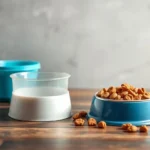
Introduction
Proper nutrition is vital for the healthy growth and development of Labrador puppies. As one of the most beloved breeds worldwide, Labradors are known for their friendly demeanor, intelligence, and boundless energy. However, their nutritional needs are unique, influenced by their size, activity levels, and potential health concerns. This article will explore the best puppy foods for Labs, equipping you with the knowledge to make informed decisions about your furry friend’s diet.
Understanding Puppy Nutrition
Importance of Nutrition in Growth and Development
A balanced diet plays a crucial role in both the physical and mental development of puppies. Nutrients such as proteins, fats, and carbohydrates fuel their growth, enhance cognitive functions, and support immune health. Conversely, poor nutrition can lead to developmental issues, stunted growth, and a host of health problems that could affect your Labrador’s quality of life.
Nutritional Requirements for Labrador Puppies
Labrador puppies have specific nutritional needs that vary as they grow. Essential nutrients include:
- Proteins: Critical for muscle development and repair.
- Fats: Provide energy and support healthy skin and coat.
- Carbohydrates: Serve as a primary energy source.
- Vitamins and Minerals: Essential for various bodily functions, including bone health and immune system support.
As your Labrador puppy matures, their dietary requirements will shift, necessitating adjustments to their food to ensure they receive the proper balance of nutrients.
Common Nutritional Myths
There are several misconceptions about puppy diets that can lead to poor feeding practices. For instance, some pet owners believe that all puppy foods are the same, but this is far from true. Different breeds have distinct nutritional needs, and it’s essential to choose foods that cater specifically to Labrador puppies for optimal health.
Key Ingredients to Look for in Puppy Food
High-Quality Proteins
When selecting the best puppy foods for Labs, prioritize high-quality protein sources. Proteins derived from animals, such as chicken, fish, and lamb, are more digestible and beneficial compared to plant-based proteins. Animal proteins provide essential amino acids necessary for growth and development.
Healthy Fats
Fats play an essential role in a puppy’s diet, providing energy and supporting overall health. Look for foods rich in omega-3 and omega-6 fatty acids, which promote healthy skin and coat. Good sources of healthy fats include fish oil and chicken fat.
Digestible Carbohydrates
Carbohydrates are vital for energy, but it’s crucial to choose digestible sources. High-fiber ingredients like brown rice and sweet potatoes not only provide energy but also support digestive health. Avoid foods with excessive fillers or low-quality grains.
Essential Vitamins and Minerals
A well-rounded puppy food should contain a balance of key vitamins and minerals, including Vitamins A, D, E, and B-complex, along with calcium and phosphorus. These nutrients are critical for bone development and overall health, helping to prevent deficiencies that can lead to long-term health issues.
Evaluation of Commercial Puppy Foods
Types of Puppy Food
When considering the best puppy foods for Labs, you will encounter various types of puppy food, including:
- Dry Kibble: Convenient and cost-effective, dry kibble is often fortified with essential nutrients.
- Wet Food: Typically more palatable, wet food can aid hydration but may be pricier.
- Raw Diets: Some owners opt for raw feeding, though it requires careful planning to ensure nutritional balance.
Understanding the pros and cons of each type will help you determine the best option for your Labrador puppy.
Reading Dog Food Labels
Deciphering dog food labels is critical to selecting high-quality puppy food. Look for a list of recognizable ingredients and check the guaranteed analysis for protein and fat content. High-quality brands will often list the specific sources of protein rather than generic terms like “meat meal.”
AAFCO Standards
The Association of American Feed Control Officials (AAFCO) establishes guidelines for pet foods. Look for puppy foods that meet AAFCO standards, as they ensure the product is nutritionally complete and suitable for growth.
The Best Puppy Foods for Labs
Top Recommended Brands
When it comes to choosing the best puppy foods for Labs, several brands stand out for their quality and formulation.
-
Brand A: Blue Buffalo Life Protection Puppy Formula
Key Ingredients: Deboned chicken, brown rice, and sweet potatoes
Pros: High-quality proteins, rich in antioxidants, grain-inclusive
Cons: Higher price point -
Brand B: Royal Canin Labrador Retriever Puppy Dry Dog Food
Key Ingredients: Chicken by-product meal, brewers rice
Pros: Tailored nutrition for Labs, supports healthy growth
Cons: Some owners prefer whole meats over by-products -
Brand C: Hill’s Science Diet Puppy Chicken Meal & Barley Recipe
Key Ingredients: Chicken meal, barley, and brown rice
Pros: Well-balanced nutrition, recommended by veterinarians
Cons: Contains some grains that some owners may wish to avoid
Comparison Table
Here’s a quick visual comparison of the top brands based on key criteria:
| Brand | Protein Content | Fat Content | Price Range |
|---|---|---|---|
| Blue Buffalo | 28% | 17% | $$ |
| Royal Canin | 27% | 15% | $$$ |
| Hill’s Science | 26% | 16% | $$ |
Budget-Friendly Options
For those on a budget, there are still quality puppy food options available. Brands like Purina Pro Plan and Iams ProActive Health offer affordable yet nutritionally balanced formulas. Look for sales, discounts, or bulk buying options to save money while ensuring your Labrador puppy gets the nutrition they need.
Specialty Diets
If your Labrador puppy has food allergies or sensitivities, consider grain-free or limited-ingredient diets. Brands like Taste of the Wild and Canidae offer specialized formulas that cater to specific dietary needs, ensuring your pup stays healthy without compromising on nutrition.
Homemade Puppy Food: Is It a Good Option?
Benefits of Homemade Diet
Some dog owners choose to prepare homemade meals for their puppies, allowing them complete control over ingredients and quality. This option can be beneficial for customizing diets to meet specific health requirements.
Risks and Considerations
While homemade diets can be advantageous, they also carry risks. Nutritional imbalances may arise if meals aren’t properly formulated, leading to deficiencies that can affect your puppy’s health. Always consult with a veterinarian before transitioning to a homemade diet to ensure nutritional adequacy.
Sample Homemade Recipes
Here are a couple of simple recipes to consider:
- Chicken and Rice Recipe
- 1 cup cooked chicken (shredded)
- 1 cup cooked brown rice
- 1/2 cup carrots (cooked and chopped)
-
Mix and serve in appropriate portions.
-
Beef and Sweet Potato Stew
- 1 cup ground beef (cooked)
- 1 cup diced sweet potatoes (cooked)
- 1/2 cup peas (cooked)
- Combine and serve in portions.
Feeding Guidelines and Schedules
Portion Control
Understanding portion sizes is crucial for preventing obesity and ensuring adequate nutrition. Consult the feeding guidelines on your puppy food packaging, adjusting based on your puppy’s specific age and weight. Avoid common mistakes like free-feeding, which can lead to overeating.
Feeding Frequency
Labrador puppies typically require multiple small meals throughout the day. Gradually transition to adult food when they reach about 12 months of age, monitoring their weight and growth to determine the right timing.
Transitioning to Adult Dog Food
When transitioning from puppy food to adult food, do so gradually over a week or two. Start by mixing small amounts of adult food with puppy food, increasing the adult portion as your puppy adjusts.
Monitoring Your Puppy’s Health
Signs of Good Nutrition
A well-nourished Labrador puppy will exhibit signs of good health, including a shiny coat, high energy levels, and firm stool consistency. Regularly monitoring these indicators can help you assess whether your puppy is thriving on their diet.
When to Consult a Vet
If you notice signs of dietary issues—such as poor coat quality, lethargy, or gastrointestinal problems—consulting a veterinarian is essential. Regular check-ups can help ensure your puppy’s diet is meeting their needs and address any health concerns early on.
Conclusion
In conclusion, providing your Labrador puppy with the best puppy foods for Labs is crucial for their overall health and development. Prioritizing high-quality ingredients, understanding their specific nutritional needs, and being mindful of portion sizes can set the foundation for a long, healthy life. As a responsible dog owner, your commitment to proper nutrition will positively impact your furry friend’s well-being for years to come.









